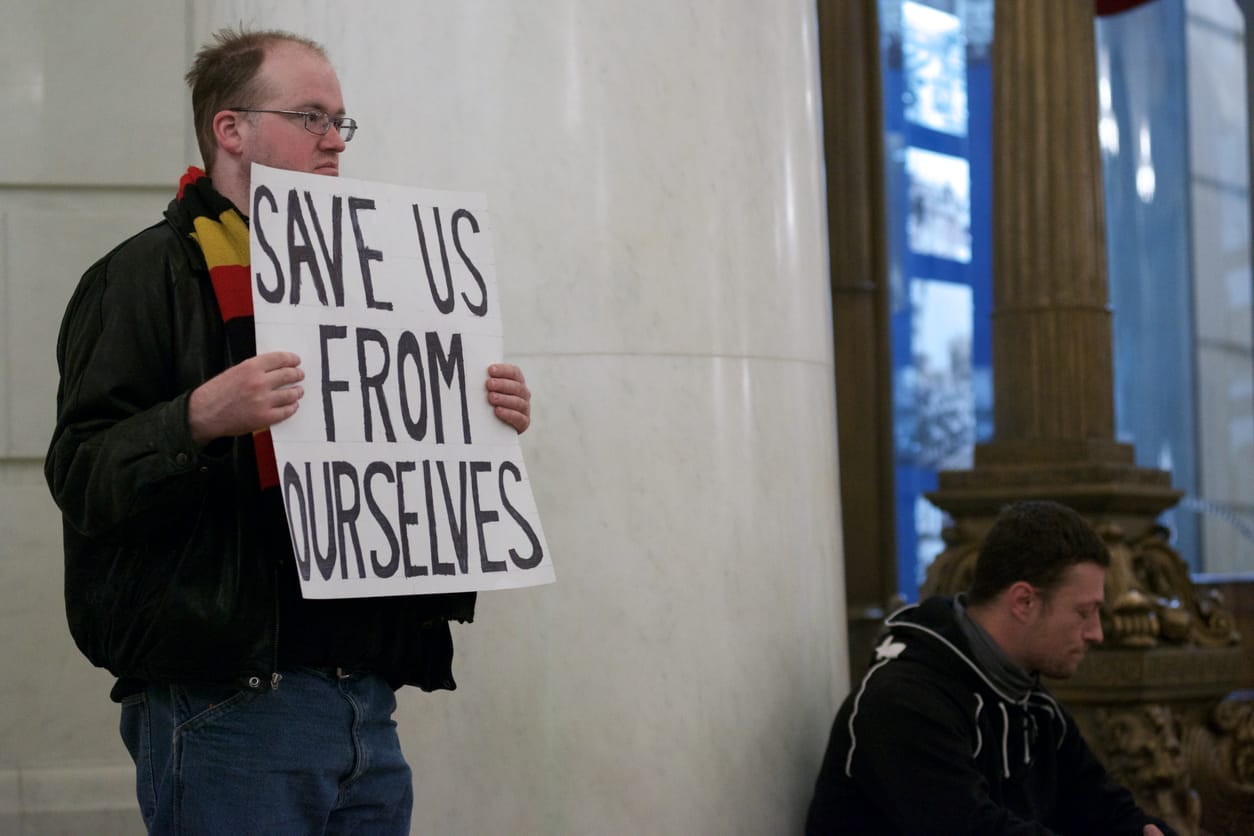You can’t outsource freedom: Mark Rienzi on why state protections matter

Mark Rienzi is the president and CEO of the Becket Fund for Religious Liberty, a nonprofit law firm dedicated to defending the free exercise of religion for people of all faiths. Under his leadership, Becket has been at the forefront of some of the most significant religious liberty cases in recent years, often appearing before the U.S. Supreme Court. A seasoned litigator and respected voice on the intersection of faith and law, Rienzi brings clarity to today’s conversation on the state of religious liberty in America. He recently spoke with American Habits Editor Ray Nothstine.
Some on the political right might say religious liberty is not an issue in the Trump era or it’s less relevant now. They might say, Trump is a big improvement on religious liberty nothing really needs to be done. What would you say to counter that kind of reactionary thinking?
Mark Rienzi: Yes, you’re right. Some people might think that way and it’s a mistake. President Trump really has been good on religious liberty. Not on everything, but for the most part. He’s certainly better than Biden was. Presidents change. What matters is getting constitutional religious liberty law right, so that no matter who’s in the White House, people of faith can live their lives and run their churches and synagogues and raise their children according to their deeply held beliefs. Saying, “I’ll just outsource it and let the government deal with it,” is always the wrong move. It never ends well.
If we already have the First Amendment, why do state religious liberty statutes matter? Is it wrong to say, ‘well we have the First Amendment, why do we need to go further?’
Rienzi: It’s important to think of religious liberty, and really all of our freedoms, as being protected by a web of overlapping safeguards that reinforce one another. The First Amendment provides strong protection for the free exercise of religion, but in practice, many state officials ignore it until someone has the time and resources to spend years in court forcing compliance. That’s why additional protections matter. State statutes, regulations, and federal laws help ensure that government actors follow the rules from the outset, rather than only after litigation. While lawsuits can and do succeed, they don’t address most situations. Most people never sue; they’re simply trying to live their lives. Multiple layers of protection help ensure that governments respect religious liberty in daily life, not just in court.
What are some examples of state laws that have strengthened religious liberty—or where their absence leaves people vulnerable? Are there any states where Becket views them as having favorable protections or is that not really concern?
Rienzi: Yes. it’s vitally important, and you’re right that there’s a variation across the country. A good example is state religious freedom restoration acts (RFRA laws) that say this state government is going to be very protective in defined ways for religious liberty and will only force someone to violate her faith if there is a compelling reason. Those laws exist in about two-thirds of the states, and they can be enormously helpful in holding state governments accountable.
Another example is states can have clear rules on the books to protect the seal of confession. Some states have tried to force priests to disclose what they hear in a confessional. We’ll take them to court, and they’ll lose, but it’s not good for the government to try to compel a priest or a member of the clergy to violate their oath. It’s far better when state legislatures decide that it’s important to protect this religious observance. The idea of simply outsourcing everything to the federal side is not enough.
Related to that, is it a bad sign when more laws are needed in a state? This is likely a cultural question of sorts. If we need more laws on religious liberty protections maybe localities and communities are falling short on civil society and neighborly etiquette. For me, it seems silly and quite evil if I desire somebody to violate their conscience and I want to compel them to do something.
Rienzi: Yes, you’re exactly right. When civil society breaks down, we see the need for more legal protections. The right way to respond to a neighbor who has different religious, racial, or political beliefs is simply to say, “God bless America.” We live in a free country where people are entitled to hold different views on matters that are deeply important.
If I want to change my neighbor’s mind, I can have a conversation. We’re free people, we’re adults, and we can talk about it. What I can’t—and shouldn’t—do is use the power of government to crush my neighbor, to take away her job, or to punish her simply because she holds a belief I don’t share. Unfortunately, that kind of bad thinking is becoming too common.
When civil society breaks down, we see the need for more legal protections.
That’s why these protections matter. They affirm that while everyone has the right to their own beliefs, no one may force others to conform or silence them. When civil society becomes less civil, the law must step in. And in doing so, the law can also lead here. The law can send the message that these freedoms matter, that this is who we are as Americans, and that this is how we treat people with different beliefs. When we get it right, we set an example for the world. Sadly, we haven’t always been getting it right lately, and tensions have been running high.
You’ve addressed this some already, Mark. Judge Louis Brandeis, the former Supreme Court justice, talked about the laboratories of democracy and there’s these laboratories of religious liberty going on now with different variations in many states. Certain courts are interpreting things different, but also, you’ve got legislatures doing different things on religious liberty. You mentioned the importance of RFRA laws but what can you add on the proper balance regarding state and federal responsibility for safeguarding religious liberty today?
Rienzi: I think that’s easy to address. It’s not about balance. Both the federal and state governments have an obligation. Every elected official, at every level, takes an oath to uphold the Constitution, and that includes protecting religious liberty. Of course, the issues may look different in North Carolina than in Alabama or California, but the duty is the same: safeguard free speech and religious freedom for the people they serve.
It’s a mistake for any official to look at another level of government and say, “They’ve got it, so I don’t need to.” Yes, local concerns like parking spaces or zoning matter; those are real parts of daily life. But religious liberty is fundamental. Every official, whether in Washington, a state capitol, or a city hall, has a solemn responsibility to defend it. That commitment is part of what makes America such a great country.
You touched on this, too. Becket has a ton of success in winning cases at the U.S. Supreme Court but is it fair to say it’s a goal to avoid having these cases adjudicated there? We celebrate the wins obviously, but are there negatives for the client(s) or for the culture more broadly if religious liberty must be vindicated that high up the chain?
Rienzi: To a point. One, you’re right in saying and sensing that, for the people who go through these cases, they can be a real grind. They face personal and public attacks. It’s not easy to be a religious liberty plaintiff. The truth is, the whole country owes them a debt of gratitude, because when they step up, they win rights for everyone. I only wish we lived in a world where those fights weren’t necessary, where no one would ever feel the need to attack those rights in the first place.
Given the fallen and messy world we live in, I’m genuinely grateful when these cases make it to the Supreme Court, because I think we have a good Court that understands these rights. And it’s not just five or six justices—it’s often all nine who get it right. That’s encouraging. It’s valuable not only because the Court gives strong answers, but also because these cases teach the country. When the Supreme Court takes up a major religious liberty case, the whole country pays attention, and that spotlight can help move society in a better direction.
Are you optimistic about the future of religious liberty in America, some would say America is becoming more secular or at least highly pluralistic and likely anchored less to its religious heritage?
Rienzi: Yes—there’s a lot to be optimistic about. There’s no doubt there are fights to be had, but when those fights come, we’ve been winning.
And I’m still a big believer in my neighbors and my fellow citizens. We mostly hear the loudest, angriest voices in the public square. Most people in the middle don’t want to crush neighbors with different religious or political beliefs. We hear the loudest voices on the fringe, but it’s still just the fringe. Most decent people are perfectly willing to live and let live.
Some get whipped up by extremists, and that hurts our discourse. Overall, I’m very optimistic. We’re right about what the law says. We’re right about what it means to live well with our neighbors. The truth is, most people, when you explain it to them, agree.
Let me give you an example. Last term, we had a case at the Supreme Court called Mahmoud v. Taylor. It was brought by several Muslim families in Montgomery County, Maryland, joined by Christian and Jewish families as well. It was quite a diverse coalition, though Mahmoud, the lead plaintiff, was Muslim. Together, they were fighting for a basic right: not to have their children subjected to public school indoctrination with transgender ideology.
This case involved three and four-year-olds, whom the school district sought to compel to be exposed to these issues. A few years ago, you might have wondered how public opinion would split on something like that. But the truth is, even in liberal Montgomery County, Maryland, a Washington Post poll found that about 70% of residents sided with our plaintiffs. And the Supreme Court ruled in their favor. I think it was healthy for the country to watch that case unfold.
I think most decent people, regardless of their views on gay rights or transgender issues, can agree that we shouldn’t be confusing three and four-year-olds with these topics or forcing them to think about sex at such a young age. Cases like this help us reach that point of clarity. And when we do, we often discover that many of our neighbors, even if they disagree on broader political questions, can still come together around common-sense solutions.
On a more personal note, why are you in this field and maybe why not say something like corporate law or something in law seen as more conventional?
Rienzi: I’m in it—and if I can broaden that a bit to include the rest of the lawyers and staff at Becket—we’re all in it because we believe this is the most important fight of our lives.
Becket’s lawyers could be making millions a year at big law firms. They’re all graduates of top schools. They and their families choose to use their God-given talents for this fight, instead of chasing wealth.
It’s a real honor for me to get to work with that group of people, and it’s a group of people who are every bit as talented as the hotshot lawyers at the biggest law firms in the country.
Our attorneys could command high salaries and prestige elsewhere. Instead, they choose to use their talents to fight for something greater, for God, for good, for their country, and for their families. That spirit of sacrifice is at the heart of our success. But we couldn’t do it without supporters who share that vision. Their generosity makes this work possible, and we’re grateful for those who stand with us.



